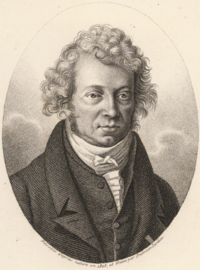André-Marie Ampère
Physicist, b. 22 January 1775 (Lyon, France), d. 10 June 1836 (Marseille).
 André-Marie Ampère came from a wealthy family. When it was time to start for formal learning his father could afford to retreat to the family's country house and devote himself to his son's education, looking after his business interests only during the winter months.
André-Marie Ampère came from a wealthy family. When it was time to start for formal learning his father could afford to retreat to the family's country house and devote himself to his son's education, looking after his business interests only during the winter months.
Well educated but in isolation from the developments of the time the young André-Marie became somewhat over-confident. By the age of 13 he unsuccessfully submitted a mathematical paper to the Académie de Lyon for publication. After reading the article on differential calculus in the Encyclopédie he realized that he had to learn more and began to study the works of Euler, Bernoulli and Lagrange.
Ampère suffered several personal tragedies during his life, which often left him depressed for weeks or months. His father died, a victim of the turbulent years of the Revolution, at the guillotine. His wife Julie died after four years of marriage. Ampère went to Paris to find scientific exchange but always longed for the happy life in the province. He supported himself as a high school teacher in mathematics and was appointed a tutor at the École Polytechnique in 1804. Five years later he advanced to professor of mathematics. In 1826 he was appointed to a chair at Université de France, where he remained for the rest of his life.
As a mathematician Ampère remained deeply interested in all branches of sciences. He studied problems in chemistry, where he devised a classification of elements. His interest in the phenomena of light led him to embrace the wave theory. After hearing of Ørsted's observations he developed a combined theory of electricity and magnetism.
Ampère's most important and influential work, the "Memoir on the Mathematical Theory of Electrodynamic Phenomena, Uniquely Deduced from Experience", appeared in 1826. In it he laid out the law of the electrodynamic force now known as Ampère's Law, which gives the quantitative relationship between a changing magnetic field and the induced electrical current.
Ampère's work style was rather unsteady. When he had a flash of inspiration he worked incessantly for days and weeks, but his energy soon fell off, and his experiments were often rough and superficial. Maxwell wrote in 1879 about the experiments described in the Memoir of 1826:
- "We can scarcely believe that Ampère really discovered the law of action by means of the experiments which he describes. We are led to suspect, what, indeed, he tells us himself, that he discovered the law by some process which he has not shown us, and that when he had afterwards built up a perfect demonstration he removed all traces of the scaffolding by which he had raised it."
In 1826 Ampère changed from the École Polytechnique, where he had to teach set topics, to the Collège de France, where he was free to teach what he preferred. He concentrated on electrodynamics and found his professional life enjoyable. His personal life continued to be full of problems, governed by difficult relationships with his son and his daughter.
Reference
O'Connor, J. J. and E. F. Robertson (2002) André Marie Ampère, School of Mathematics and Statistics, University of St Andrews, Scotland,
http://www-history.mcs.st-andrews.ac.uk/Mathematicians/Poisson.html (accessed 1 June 2004)
Portrait: Engraving by Ambroise Tardieu, 1825, The Dibner Library Portrait Collection, Smithsonian Institution, USA; public domain.
home
 André-Marie Ampère came from a wealthy family. When it was time to start for formal learning his father could afford to retreat to the family's country house and devote himself to his son's education, looking after his business interests only during the winter months.
André-Marie Ampère came from a wealthy family. When it was time to start for formal learning his father could afford to retreat to the family's country house and devote himself to his son's education, looking after his business interests only during the winter months.